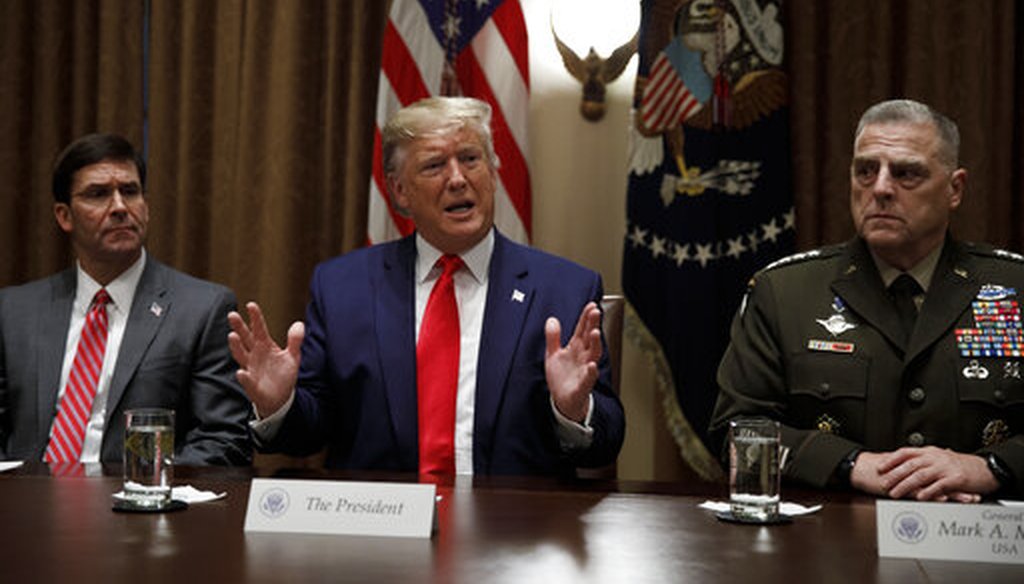Stand up for the facts!
Our only agenda is to publish the truth so you can be an informed participant in democracy.
We need your help.
I would like to contribute

President Donald Trump, joined by Defense Secretary Mark Esper and Chairman of the Joint Chiefs of Staff Gen. Mark Milley, speaks during a briefing with senior military leaders at the White House on Oct. 7, 2019. (AP/Kaster)
President Donald Trump shocked lawmakers from both parties recently when he announced the United States would be withdrawing troops from the Syrian border with Turkey.
Political leaders and military officials said the U.S. troop presence in northeast Syria helps keep Islamic State terrorists in check and prevents Iranian and Russian aggression. And they worried about the Turkish military retaliating against Kurdish U.S. allies in the region.
Facing a bipartisan backlash, Trump defended his thinking on Twitter and at an Oct. 7 press conference. He made a number of claims that needed a fact-check.
The Trump campaign referred our inquiries to the White House and Defense Department, neither of which responded to our questions by deadline.
"The United States was supposed to be in Syria for 30 days, that was many years ago. We stayed and got deeper and deeper into battle with no aim in sight."
The United States was supposed to be in Syria for 30 days, that was many years ago. We stayed and got deeper and deeper into battle with no aim in sight. When I arrived in Washington, ISIS was running rampant in the area. We quickly defeated 100% of the ISIS Caliphate,.....
— Donald J. Trump (@realDonaldTrump) October 7, 2019
Trump’s claim about an early timeline is wrong.
Multiple experts told us that they had never heard of a specific timeline for the U.S. involvement in Syria, which started in late 2015 under former President Barack Obama. And Brett McGurk, Trump’s former special envoy to the anti-ISIS coalition, responded to Trump on Twitter, saying "none of this is true."
"I’m not aware of a commitment to only have U.S. troops in Syria for 30 days that was made ‘many years ago,’" said Will Todman, associate fellow in the Middle East program and the Center for Strategic and International Studies.
Trump could have been referring back to when he first ordered the removal of U.S. troops from Syria in December 2018. He gave the Defense Department a 30-day timeline for withdrawal. Trump backtracked shortly after, saying the military could take a few months to get out of Syria.
"When I arrived in Washington, ISIS was running rampant in the area. We quickly defeated 100% of the ISIS Caliphate."
The United States was supposed to be in Syria for 30 days, that was many years ago. We stayed and got deeper and deeper into battle with no aim in sight. When I arrived in Washington, ISIS was running rampant in the area. We quickly defeated 100% of the ISIS Caliphate,.....
— Donald J. Trump (@realDonaldTrump) October 7, 2019
This claim is misleading. While ISIS’s land holdings have been depleted, the group still poses a legitimate threat.
According to data we have analyzed, ISIS controlled about 89% less territory at the start of 2018 as compared with the beginning of Trump’s presidency. This map from the Congressional Research Service shows the extent of lost ISIS territory through August 2018.
But it’s a far cry to say ISIS has been defeated — even if its physical land holdings have been largely dismantled. Experts told us ISIS is still capable of carrying out attacks across the globe. The New York Times reported that as many as 18,000 fighters remain in Iraq and Syria.
"....including capturing thousands of ISIS fighters, mostly from Europe."
....including capturing thousands of ISIS fighters, mostly from Europe. But Europe did not want them back, they said you keep them USA! I said “NO, we did you a great favor and now you want us to hold them in U.S. prisons at tremendous cost. They are yours for trials.” They.....
— Donald J. Trump (@realDonaldTrump) October 7, 2019
Trump is wrong to claim that the majority of ISIS fighters captured in Syria came from Europe.
About 8,000 of the roughly 10,000 ISIS fighters behind bars in northeast Syria are Iraqi or Syrian nationals, according to a report from the inspectors general of the Defense Department, State Department and U.S. Agency for International Development.
A minority of those fighters — about 2,000 — are from other countries, including 800 who are believed to be from European nations.
"But Europe did not want them back, they said you keep them USA! I said ‘NO, we did you a great favor and now you want us to hold them in U.S. prisons at tremendous cost. They are yours for trials.’"
....including capturing thousands of ISIS fighters, mostly from Europe. But Europe did not want them back, they said you keep them USA! I said “NO, we did you a great favor and now you want us to hold them in U.S. prisons at tremendous cost. They are yours for trials.” They.....
— Donald J. Trump (@realDonaldTrump) October 7, 2019
It’s true that European nations have rejected ISIS prisoners. Contrary to what Trump said, however, that has not increased the burden faced by the United States.
Many European countries have refused to take back ISIS fighters who were captured in Syria after leaving their countries, experts told PolitiFact. And the United Kingdom, Todman said, has stripped some ISIS fighters of their citizenship.
"European countries have been very reluctant to repatriate their foreign fighters given the lack of evidence and attendant difficulties in prosecuting on criminal charges," said Bruce Hoffman, senior fellow for counterterrorism and homeland security at the Council on Foreign Relations.
The countries, Hoffman added, have "no idea how to reintegrate them back into western societies in a way that ensures (they) will not pose a threat."
That said, Europe’s resistance has not meant that much more work for the United States. "Europe has been reluctant to take them back, but has not foisted them on the U.S.," said John Mueller, professor of political science at the Ohio State University.
The captured fighters are being held in "pop-up prisons" operated by the Syrian Democratic Forces with "meager resources" provided by the United States, McGurk said on Twitter.
"When I took over, our Military was totally depleted. Now it is stronger than ever before."
....down, watching over a quagmire, & spending big dollars to do so. When I took over, our Military was totally depleted. Now it is stronger than ever before. The endless and ridiculous wars are ENDING! We will be focused on the big picture, knowing we can always go back & BLAST!
— Donald J. Trump (@realDonaldTrump) October 7, 2019
This claim is heavy on hyperbole and short on truth. The military wasn’t depleted when Trump took office, and his efforts to grow the military have been within historic norms.
In July 2017 we rated False Trump’s claim of achieving a "historic increase in defense spending." Trump’s proposed base spending cap for 2017-18 defense spending was $603 billion, a 9.4% increase. But there had been 10 years since 1977 when the base level had gone up by more than that, and in some years, the increase more than doubled Trump’s.
Trump also has claimed troops received "one of the biggest pay raises" ever, and that it was the first pay increase in "more than 10 years." We rated that claim Pants on Fire.
After taking office, Trump’s White House website said that "our Navy has shrunk from more than 500 ships in 1991 to 275 in 2016." The numbers checked out, but experts said the reason is that ships today are more expensive and powerful than in the past. As a matter of policy, the Navy has chosen to put more technology and money into a smaller number of bigger ships. The Navy remained powerful compared with other countries, experts said.
As of Oct. 8, the Navy has 290 deployable battle force ships.
Trump’s promise to build a Navy of 350 surface ships and submarines is In the Works.
"When I took over our military, we didn't have ammunition. I was told by a top general — maybe the top of them all — ‘Sir, I'm sorry. Sir, we don't have ammunition.’ "
This exchange is unconfirmed. Trump made a similar claim in September, identifying former Defense Secretary James Mattis as the source of the ammunition comment.
According to Trump, Mattis told him early in Trump’s administration the military was "very low on ammunition" when they were at a position "with a certain country" and "may have had a conflict."
"And he said to me, ‘Sir, if you could, delay it, because we’re very low on ammunition’," Trump said in September.
We did not find public confirmation from Mattis that such a conversation took place. Trump could be talking about the Defense Department’s shortage and redistribution of weapons around the time he became president.
"The president appears to be exaggerating ordnance shortfalls for ISIS operations around the time he took office," tweeted Paul D. Shinkman, a national security correspondent who wrote a related February 2017 U.S. News & World Report article.
"Shortages of bombs and other munitions" forced the military to get weapons from its headquarters in other parts of the world in order to carry out its air campaign against the Islamic State, said U.S. News & World Report’s article.
In February 2016, then-Defense Secretary Ash Carter raised concern about the weapons shortages and asked Congress for $2 billion more to increase bomb production. By March, the article said, manufacturers began to significantly increase their output.
U.S. News & World Report quoted a spokesman for the Joint Staff, Air Force Col. Randall Ackerman, as saying that a shortage problem persisted in early 2017 and that they were determining if existing munitions within one combatant command could be redistributed to replenish shortfalls in munitions in another.
The story reported that officials for the campaign against ISIS said that the U.S.-led coalition had enough weapons to carry out its mission. It quoted an unnamed spokesman for Operation Inherent Resolve as saying that their fight was "not affected because of a lack of munitions."
"The two most unhappy countries at this move are Russia & China."
I was elected on getting out of these ridiculous endless wars, where our great Military functions as a policing operation to the benefit of people who don’t even like the USA. The two most unhappy countries at this move are Russia & China, because they love seeing us bogged.....
— Donald J. Trump (@realDonaldTrump) October 7, 2019
Russia stands to benefit from the withdrawal of U.S. troops from Syria, while China might be disadvantaged by instability in the region.
The United States and Russia are on opposite sides of the complex Syrian civil war, with Russia backing the Syrian government and the United States supporting opposition groups. Russian President Vladimir Putin has said American troops shouldn’t be in Syria, arguing that their presence is illegitimate because it was not approved by a United Nations Security Council resolution and because the Syrian government did not invite the United States into its country.
"Russia and the Syrian regime will both benefit," Todman wrote in a blog post about Trump’s most recent announcement. "Russia will further enhance its ability to determine Syria’s future because the United States is giving up a key aspect of its leverage in Syria without gaining any concessions from the Syrian regime in return."
Broadly speaking, Todman told PolitiFact, China benefits from stability in the Middle East, which allows it to pursue its economic interests.
"However, China has not contributed seriously to security operations in the region — it relies on the United States and others to do that," Todman said. "Therefore, China opposes the potential withdrawal of U.S. forces from eastern Syria because it fears prolonged instability that could ensue in the resource-rich area, which could harm its economic interests."
When Trump in December 2018 announced U.S. troops’ withdrawal from Syria, he also claimed that "Russia, Iran, Syria & many others" were "not happy." We rated that False.
"The UK was very thrilled at this decision."
We’ve seen no public comments of excitement from Boris Johnson, the United Kingdom’s prime minister. (We checked his official social media accounts, latest statements, and media reports.)
Johnson’s spokesman on Oct. 8 said Britain was deeply concerned that Turkey planned to launch a military campaign in northern Syria, and that U.S. troops movements are a matter for the United States, Reuters reported.
Andrew Murrison, a junior Foreign Office minister said he had "no idea" where Trump’s remark came from, the Guardian reported Oct. 8. "It certainly isn’t based upon the conversation that my right honourable friend (Foreign secretary Dominic Raab) had with Secretary of State Pompeo last night," Murrison said.
"As I have stated strongly before, and just to reiterate, if Turkey does anything that I, in my great and unmatched wisdom, consider to be off limits, I will totally destroy and obliterate the Economy of Turkey (I’ve done before!)"
As I have stated strongly before, and just to reiterate, if Turkey does anything that I, in my great and unmatched wisdom, consider to be off limits, I will totally destroy and obliterate the Economy of Turkey (I’ve done before!). They must, with Europe and others, watch over...
— Donald J. Trump (@realDonaldTrump) October 7, 2019
Trump’s claim that he has destroyed Turkey’s economy before is a reference to his pressure on Turkey for the 2018 release of Andrew Brunson, an American citizen and pastor who lived in Turkey for more than 20 years. Turkey detained Brunson in October 2016 on charges of supporting a terrorist organization and political or military espionage. Brunson denied the charges.
The Trump administration called for Turkey’s release of Brunson, it doubled tariffs on steel and aluminum from Turkey, and in August 2018 placed economic sanctions on Turkish officials.
"Recent conflicts between Turkey's central bank and government have put pressure on the lira, which has shed nearly 40% of its value this year and is one of the worst-performing currencies of 2018," Business Insider reported Oct. 11, 2018.
Brunson was convicted on Oct. 12, 2018, on charge of aiding terrorism but was released the same day and subsequently returned to the United States. A judge determined that Brunson’s two-year detainment and good conduct counted toward his sentence.
The United States in November 2018 lifted the sanctions on Turkey’s officials.
Our Sources
Donald J. Trump on Twitter, Oct. 7, 2019
Brett McGurk on Twitter, Oct. 7, 2019
Brett McGurk on Twitter, Oct. 7, 2019
Lead Inspector General Report to the United States Congress, "Operation Inherent Resolve," June 30, 2019
U.S. Department of State, "Special Envoy for the Global Coalition to Defeat ISIS Ambassador James F. Jeffrey And Counterterrorism Coordinator Ambassador Nathan A. Sales," Aug. 1, 2019
The New York Times, "ISIS Is Regaining Strength in Iraq and Syria," Aug. 19, 2019
The Guardian, "Jack Letts stripped of British citizenship," Aug. 18, 2019
The Atlantic, "Europe Has Turned Its Back on Its ISIS Suspects," July 5, 2019
The New York Times, "Trump to Allow Months for Troop Withdrawal in Syria, Officials Say," Dec. 31, 2018
The New York Times, "Trump to Withdraw U.S. Forces From Syria, Declaring ‘We Have Won Against ISIS,’" Dec. 19, 2018
Congressional Research Service, "The Islamic State and U.S. Policy," Sept. 25, 2018
Markets.businessinsider.com, "Turkey's currency jumps after Washington and Ankara reportedly reach deal to release detained American pastor," Oct. 11, 2018
WhiteHouse.gov, "Remarks by President Trump at Signing of the U.S.-Japan Trade Agreement and U.S.-Japan Digital Trade Agreement," Oct. 7, 2019
The Guardian, "UK voices concerns over a Turkish invasion of Kurdish-run Syria," Oct. 8, 2019
Reuters, "UK deeply concerned about Turkish plans for Syria military action: PM's spokesman," Oct. 8, 2019
Twitter, @10downingstreet, @UKParliament, @BorisJohnson, @Conservatives
Facebook, Boris Johnson official page
Instagram, Boris Johnson official page
Gov.uk, News and communications
Center for Strategic and International Studies, "The Implications of a Turkish Intervention in Northeastern Syria," Oct. 7, 2019
Kremlin, "Vladimir Putin’s annual news conference," Dec. 20, 2018
PolitiFact, "Donald Trump claims Russia is 'not happy' U.S. troops are leaving Syria. That isn't true," Dec. 21, 2018
U.S. News & World Report, "ISIS War Drains U.S. Bomb Supply," Feb. 17, 2017
Twitter, @PDShinkman tweet, OCt. 7, 2019
United States Commission on International Religious Freedom, Pastor Andrew Brunson
Foreignpolicy.com, "Erdogan May Have Freed Pastor Brunson, But Turkey’s Economy Is Still Trapped," Oct. 16, 2018
WhiteHouse.gov, "Remarks by President Trump and Crown Prince Salman of Bahrain Before Bilateral Meeting," Sept. 16, 2019
US Navy - Naval History and Heritage Command, US Ship Force Levels 1886-present
CNN, "From treason to ISIS in Syria: fact-checking Trump's weekend barrage of false claims," Oct. 7, 2019
The Associated Press, "A timeline of the US involvement in Syria’s conflict," Jan. 11, 2019
PolitiFact, "Mike Pence wrong that ISIS has been defeated," Jan. 17, 2019
PolitiFact, "Donald Trump: ISIS territory losses near 100 percent," Jan. 30, 2018
PolitiFact Florida, "Donald Trump says Navy has shrunk dramatically since 1991," Jan. 20, 2017
PolitiFact, "Trump wrong on size and timing of military pay increases," Dec. 27, 2018
PolitiFact, "In Youngstown, Trump incorrectly says he has achieved historic increase in defense spending," July 27, 2018
PolitiFact, "Donald Trump claims Russia is 'not happy' U.S. troops are leaving Syria. That isn't true," Dec. 21, 2018
Treasury Department, Global Magnitsky Designations Removals, Nov. 2, 2018
Email interview with Will Todman, associate fellow in the Middle East program and the Center for Strategic and International Studies, Oct. 8, 2019
Email interview with Bruce Hoffman, senior fellow for counterterrorism and homeland security at the Council on Foreign Relations, Oct. 8, 2019
Email interview with Michael O’Hanlon, a senior fellow in foreign policy at the Brookings Institute, Oct. 8, 2019
Email interview with John Mueller, professor of political science at the Ohio State University, Oct. 8, 2019

































